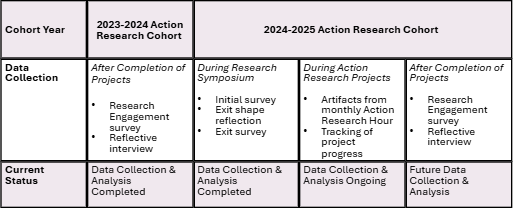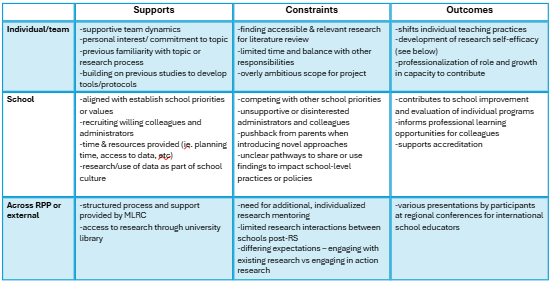According to a recent study, just one-third of teachers regularly draw on research to inform their teaching—a trend largely attributed to heavy workloads and limited time to explore and apply new strategies (Walsh et al., 2022). Esther Bettney Heidt (MLRC School Network Researcher) and Jon Nordmeyer (MLRC School Network Director) are currently examining how engagement in action research can help address this gap between research and practice.
As a research-practice partnership (RPP), the MLRC School Network provides opportunities for educators to engage with high-quality collaborative research activities. Through intentionally-designed inquiry, teachers and leaders can better understand their own school context, improve teaching quality, and develop research self-efficacy. In the past two years, 272 educators have participated in action research through the MLRC School Network.
Action research, a process with roots in the work of Lewin (1946), is a powerful form of participatory and boundary crossing inquiry situated in schools and classrooms. Action research uses a cyclical process of systematic inquiry where educators critically examine and evaluate their own practices to effect positive change within their specific context.
As part of a larger multi-year study, we are currently focused on the following research question:
What are the supports, constraints and outcomes of practitioners engaging with Action Research about multilingual teaching and learning within the context of a global research-practice partnership?
110 participants in this study have engaged in action research with the MLRC (25 in 2023-2024 and 85 in 2024-2025). To learn more about the process of action research within the MLRC, visit MLRC Action Research.
As participants engage in action research, we are collecting and analyzing various forms of quantitative and qualitative data.

Based on our initial analysis, we identified supports, constraints and outcomes across three levels: Individual/Team, School and Across RPP or External.

Initial findings from our study outline key supports and constraints of action research within a global RPP. Participants note how engaging with other participants at the Research Symposium and the structured process and support provided by the MLRC were important factors contributing to their success. On the other hand, we note limited evidence of sustained research interactions between participating schools after the Research Symposium and an expressed desire for more individualized research mentoring. To address these issues, 2025-2026 participants will be connected with a MLRC Action Research Coach to provide additional support. We will also launch DIG (Dissemination and Implementation Group) to strengthen collaborative relationships across teams and support teams in opportunities to expand their impact, after completing their first round of action research.
Ongoing data collection and analysis will be necessary to further explore our initial findings and to consider their application across various contexts. By studying what works, for whom, and in what context, the School Network also has potential to contribute research insights to the larger field of multilingual learner education.
References
Lewin, K. (1946). Action research and minority problems. Journal of Social Issues, 2(4), 34–46.
Walsh, L., Gleeson, J., Cutler, B., Rickinson, M., Cirkony, C., & Salisbury, M. (2022). What, why, when and how: Australian educators’ use of research in schools. Monash University. https://doi.org/10.26180/17192990.v1



